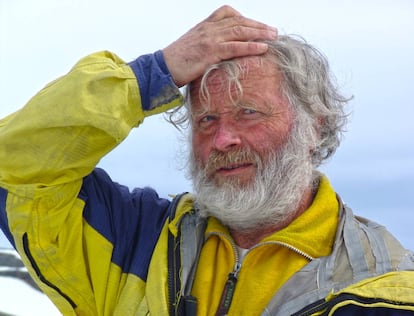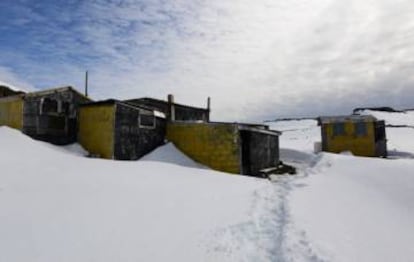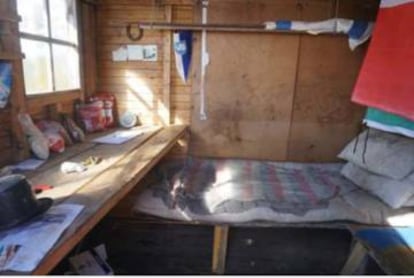Squat of the Antarctic
Thirty years ago, Jaroslav Pavlicek built the only private base on the frozen continent. But now it could be demolished over safety fears
Wanted: volunteers of all ages – “including children and disabled people as well” – for an extreme survival experiment in Antarctica. The minimum stay is 45 days, up to a maximum period of one year. The cost of the stay, including transportation and equipment, can add up to €5,000 and must be covered by the volunteers themselves, although accommodation and food are provided free of charge.

So says the ad on the website of Eco-Nelson, the only existing private base on the ice-covered continent. In 1989, a Czech citizen named Jaroslav Pavlicek arrived on the inhospitable island of Nelson Rock, located around 700 kilometers from Cape Horn. There he began to build himself a shelter near a beach where no ice ever forms, and where temperatures range between 3ºC and -11ºC.
His goal was to keep human impact down to a minimum. Detergent, soap, shampoo and toothpaste became off limits. Plates would be licked clean. Each volunteer was only allowed to bring eight kilograms of personal objects, and had to carry all waste back on the return trip.
The base was equipped with mattresses, wood stoves and a few books – the bare necessities for survival. The motto: “Keep yourself busy, help others.”
Volunteers had to document everything they did and saw, but they were told not to visit the nearby bases, and had to survive on the bare minimum at the base
Efrat Nakash, acquaintance
The enclave has become the only existing privately owned base in Antarctica, a fact that sets a dangerous precedent on a continent that is reserved for scientific research, and which enjoys special environmental protection.
In 2015, at the age of 72, Pavlicek was still traveling to Eco-Nelson. This newspaper was unable to reach him for comment, although last year he was still issuing email invitations to potential volunteers, asking them to undergo a prior survival course in Czech Republic.
By his own website’s account, Pavlicek dropped his studies in 1968 when the Warsaw Pact armies invaded his country and went off to the Tatras mountains to work as a porter. That is how he began to take an interest in climbing and survival in extreme weather conditions.

In 1988 he sailed to Antarctica for the first of more than 30 trips, to conduct his experiments in survival. The Eco-Nelson website shows photographs of adults and children living on the premises.
In January 2015, an official inspection raised the alarm. Representatives from Czech Republic and Britain were concerned to find people living in the snow-covered refuge. Some of the rooms were covered in ice, and there was a high risk of collapse. There was hardly any emergency equipment to be found, and the few items inside the medicine cabinet had expired over 10 years earlier.
Pavlicek himself told the inspectors that children as young as seven had been at the base with their parents, conducting experiments in survival.
In order to reach the island every year and secure supplies for its dwellers, the adventurer was relying on the support of the residents of nearby bases on King George Island, and from private cruise ships that bring tourists to the area.
He has no cellphone, he disapproves of them. He works tirelessly on his survival books, and talks of practically nothing else.
Mart Eslem, friend
In their May 2015 report to the 52 countries that are signatories to the Antarctic Treaty, inspectors recommended tearing down the base, composed of four wooden huts, and cleaning up the area.
“The huts were now in an extremely poor state and there was no evidence of any significant recent repairs or ongoing maintenance,” read the report. “The largest room in the main hut had at least 30 centimeters of solid ice on the floor, indicating a lengthy period of neglect. It was the strong opinion of the Observers that the facility posed a significant safety risk, not least fire but also of collapse.”
As for the earlier experiments with children, the report stated that “given the ages of the children involved, one as young as seven, the Observers were very concerned that such amateur, and in their opinion potentially unsafe and unethical, experiments had been carried out.”
A year later, another set of inspectors from Chile and Argentina visited the base, and found fishing buoys, old oil barrels and an inflatable boat motor. Again, this team recommended dismantling the base. By then, Pavlicek was no longer there.
Efrat Nakash, from Israel, met Pavlicek in 2004, when she spent a few hours at the base with a group of tourists who arrived there by boat.

“Volunteers had to document everything they did and saw, but they were told not to visit the nearby bases, and had to survive on the bare minimum at the base,” she recalls.
“Following the 9/11 attacks, Chile ceased providing air transportation, and one volunteer was trapped at the base for three months,” she adds.
Nakash has fond memories of Pavlicek. “I used to work for a computer company; I had a large salary, an expensive car and lived in a penthouse.” she says in a telephone conversation from her home near Tel Aviv. “After meeting him, my life began to change. I told myself that I didn’t need all my possessions. I went off to India as a volunteer. I sold the penthouse, and now live in a humble home and give talks about my trips, and also do coaching.”
A year after Nakash met Pavlicek, an official inspection by the UK, Australia and Peru described the base as “improvised yet clearly functional.” Observers underscored the minimal environmental impact of the facility, which included a wood stove and a small wind turbine. But there were other reasons for concern.
“It was the only permanent construction in private hands in the entire continent of Antarctica, and it was setting a very dangerous precedent that could lead to more private property,” recalls Rod Downie, who was a British inspector at the time.
It was the only permanent construction in private hands in the entire continent of Antarctica, and it was setting a very dangerous precedent
Rod Downey, ex-inspector
“It was the most rudimentary camp that we visited in 2005,” recalls Thomas Maggs, who was the environmental chief of the Australian Antarctic Division.
In his opinion, the base is an oddity from times past, but he feels that Pavlicek’s presence poses no threat to either scientific or political activities in the area.
“It is possibly testimony to the fact that Antarctica is a continent without any real borders, a heritage of humanity and one of the few ideal places on Earth to test your own survival skills,” he said.
Other scientists who have been at the base portray Pavlicek as a madman who endangers the life of anyone who comes to visit
But other scientists who have been at the base portray Pavlicek as a madman who endangers the life of anyone who comes to visit.
“Pavlicek no longer travels to Antarctica,” said a spokesman for the Czech Foreign Ministry, which admits that there is a legal hurdle in the way of the recommendations to tear down the base: Eco-Nelson was built before the signing of the Protocol on Environmental Protection to the Antarctic Treaty in 1991.
Eco-Nelson’s owner has no ties to his country’s Antarctica program, said the ministry source, adding that the government is taking steps to solve the problem – including demolishing the base and dealing with “property issues.”
There are plans to clean up the area, bring in emergency equipment and supplies, tear down the ramshackle buildings, and use the facility for scientific research in future, according to a document presented by Czech representatives at the last meeting of the Antarctic Treaty, held in Beijing early this month, and to which EL PAÍS has had access.
Mart Eslem, a friend of Pavlicek’s who traveled to Antarctica and spent Christmas Day at the base in 2007, explains that Pavlicek lives “very modestly” in Czech Republic with his wife. “His house is in the same style as the Eco-Nelson base. He has no cellphone, he disapproves of them. He works tirelessly on his survival books, and talks of practically nothing else. His two daughters call him a homeless man.”
English version by Susana Urra.








































